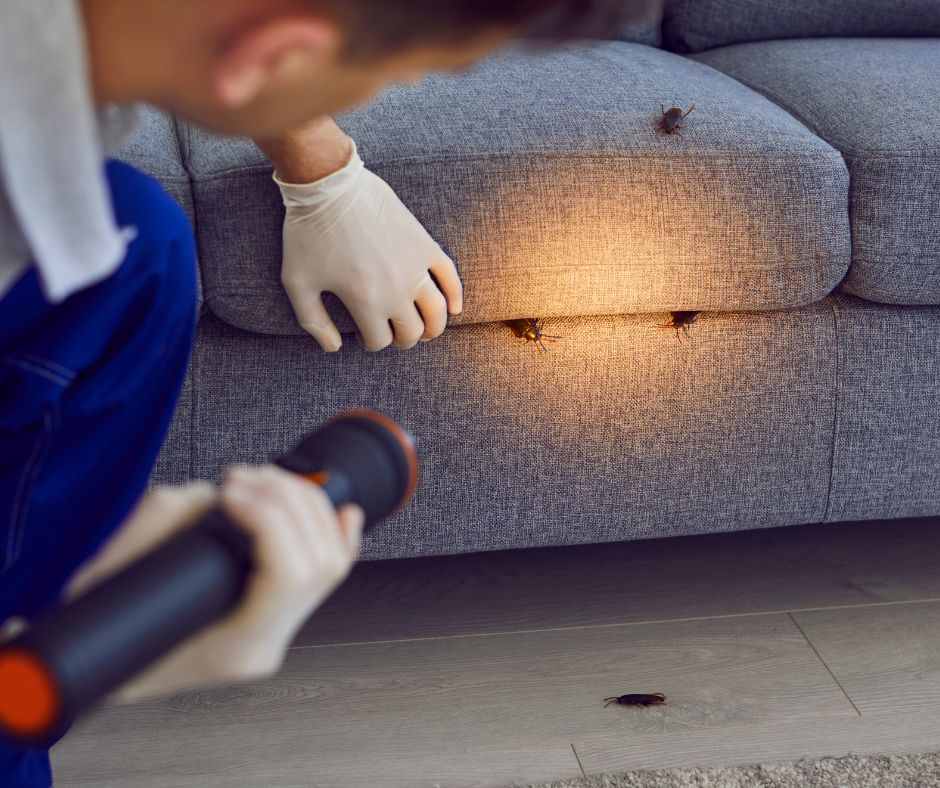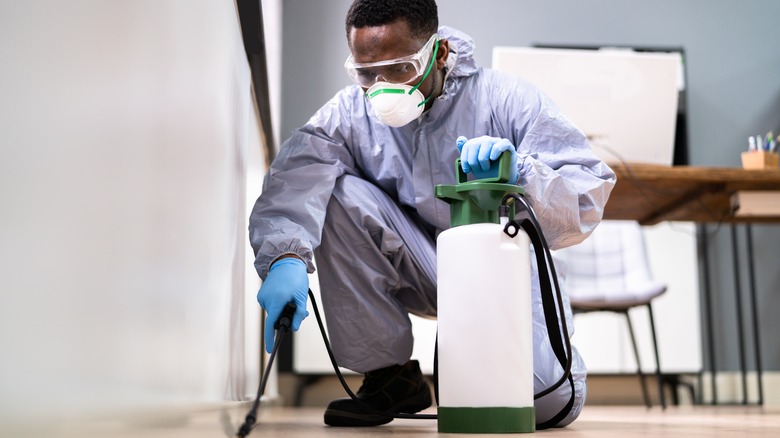Get Rid of Mosquitoes with Professional Mosquito Control Services in Port Charlotte
Wiki Article
Discover the Significance of Parasite Control in Preserving a Healthy Atmosphere and Treatment Methods

The Function of Pests in Ecosystems
Parasites, commonly checked out entirely as nuisances, play a complex duty in environments that is important for maintaining eco-friendly balance. They add dramatically to different ecological processes, including pollination, vitamins and mineral cycling, and pest control. For instance, lots of insect types, such as butterflies and bees, are crucial pollinators for a vast array of plants, which subsequently supports biodiversity and food manufacturing.In addition, insects offer as victim for countless predators, developing an essential web link in food webs. This connection ensures the survival of numerous types and helps control populaces within communities (Termite treatment Port Charlotte). Decomposer insects, such as certain beetles and fungi, are crucial in breaking down organic issue, hence enriching soil and promoting nutrient recycling.
Alternatively, while pests can be useful, their overpopulation or intrusion right into non-native environments may interfere with these eco-friendly features. This intricacy underscores the importance of recognizing pest dynamics, as efficient bug monitoring strategies should think about both their eco-friendly duties and possible influence on human tasks. Stabilizing pest visibility while decreasing harm is important for protecting the stability of environments and making certain farming performance.
Wellness Threats Connected With Bugs
The existence of pests in various environments prolongs past their eco-friendly roles, as they additionally pose considerable health and wellness dangers to people and animals. Numerous insects, including rats, pests, and bloodsuckers, are carriers of diseases that can have significant wellness ramifications. Rodents are known to send hantavirus and leptospirosis, both of which can lead to extreme respiratory and renal concerns, respectively.Insects such as insects and ticks are infamous for spreading out vector-borne illness like malaria, dengue high temperature, and Lyme illness. These diseases can cause high morbidity and mortality prices, especially in vulnerable populaces. Furthermore, pests like roaches and insects can exacerbate allergic reactions and asthma, adding to respiratory system issues in individuals, specifically those with pre-existing conditions.
In addition, the existence of parasites can cause psychological stress and anxiety and discomfort, influencing overall health. Contamination of food and surfaces by parasite droppings and remains can bring about foodborne diseases, highlighting the relevance of preserving hygienic conditions. Consequently, understanding the wellness risks connected with parasites is essential in acknowledging the need of effective bug management techniques to guard human and animal health and wellness.

Benefits of Reliable Pest Control
Effective pest control is essential for maintaining a healthy and risk-free setting, as it constantly alleviates the various risks connected with parasite problems. Among the key advantages of effective pest management is the decrease of carcinogen. Insects such as roaches, rats, and mosquitoes are vectors for conditions that can influence both family pets and human beings. By controlling these populaces, the possibility of condition transmission is dramatically reduced.Furthermore, reliable insect control safeguards residential or commercial property and frameworks from damage. Several insects, like termites and woodworker ants, can cause substantial structural damage that might require expensive fixings. By proactively handling these businesses, invasions and home owners can shield their investments.
One more substantial benefit is the improvement of overall high quality of life. A pest-free atmosphere adds to mental health and lowers stress related to invasions. Reliable bug control cultivates a more secure atmosphere for kids and family pets, guaranteeing that homes remain sanctuaries free from disease-causing organisms and harmful chemicals.
Usual Pest Control Techniques

In the realm of parasite administration, various strategies are utilized to combat problems efficiently. These strategies can be extensively categorized right into three primary approaches: social, mechanical, and chemical controls.
Cultural control entails modifying techniques to decrease bug reproduction, facility, and survival. This might include crop rotation, correct cleanliness, and habitat adjustment, which jointly create a setting less for pest proliferation.
Mechanical control utilizes physical approaches to eliminate insects (Termite treatment Port Charlotte). Strategies such as obstacles, catches, and vacuums are frequently made use of to directly remove insects from a location. This strategy is particularly reliable for taking care of rats and pests without the use of hazardous chemicals
Chemical control entails the application of pesticides to manage pests. These compounds can be classified right into herbicides, fungicides, and insecticides, each targeting particular kinds of bugs. It is critical to use these chemicals judiciously, adhering to security standards and regulations to lessen prospective damage to non-target types and the setting.
Each parasite control strategy has its benefits and constraints, and usually, an incorporated strategy incorporating numerous techniques yields the finest cause keeping a pest-free setting.
Lasting Bug Administration Practices
Sustainable insect management practices encompass a variety of techniques developed to reduce environmental effect while properly regulating bug populations. These practices focus on using ecologically friendly methods over chemical pesticides, thereby lowering the risk of injury to non-target types, including advantageous insects, wild animals, and people.Integrated Pest Monitoring (IPM) is a keystone of sustainable practices, incorporating biological, cultural, mechanical, and chemical techniques to handle pests. Biological control includes introducing all-natural predators or bloodsuckers to reduce pest populaces. Cultural methods, such as crop turning and polyculture, interfere with pest life cycles and boost environment resilience.
Mechanical approaches, such as barriers or catches, can effectively stop insect accessibility without chemical intervention. In addition, maintaining healthy ecosystems with correct soil monitoring, plant health, and biodiversity can naturally minimize insect concerns.
Education and understanding are essential components, equipping areas and people to recognize bug threats early and carry out preventive procedures. Termite treatment Port Charlotte. By fostering a holistic method that stabilizes pest control with ecological stability, lasting parasite management methods not just shield frameworks and plants yet also contribute to a healthier atmosphere for future generations
Final Thought

Comprehending the wellness risks connected with parasites is important in identifying the necessity of efficient parasite management methods to guard human and animal health and wellness.
Efficient parasite control is crucial for preserving a healthy and safe atmosphere, as it constantly mitigates the various threats linked with pest invasions.Integrated Parasite Management (IPM) is a cornerstone of sustainable techniques, incorporating organic, cultural, mechanical, and chemical strategies to handle bugs. By recognizing the duty of pests, recognizing involved health and wellness risks, and utilizing varied therapy strategies, a lasting strategy to pest monitoring can be attained. Integrated Pest Management (IPM) emphasizes a holistic approach that reduces damage to helpful microorganisms while successfully regulating bug populaces.
Report this wiki page